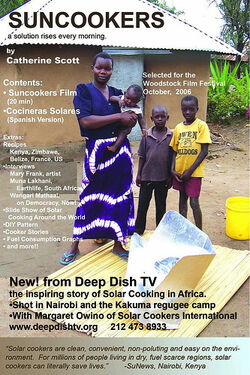Power To The People
Power To The People: choose from 4 films about energy conservation and generation and a discussion of local initiatives and opportunities
Power Shift 26 minutes
Hosted and narrated by Cameron Diaz
This lively four-part program circles the globe, exploring the remarkable ways that energy touches our daily lives.
Cleverly weaving together the lives of astronauts in the Space Station, villagers in the Amazon, and an actress in Hollywood, the film examines vital energy issues and suggests ways that students can help contribute to a sustainable energy future.
In Connections, viewers discover how energy links us as a global community. Cradle to Cradle profiles architect William McDonough, a Time magazine "Hero of the Planet," and his innovative green building designs. Energy Path answers the question, “When I turn on the light in my room, where does the electricity come from and how does it reach me?” Be the Difference encourages personal action steps such as requesting renewable energy from utilities, driving hybrid cars, and buying energy-efficient appliances.
Power Shift serves as a terrific thought-starter and discussion tool for sparking a conversation around energy, sustainability and practical ways we can each make a difference.
Kilowatt Ours 38 minutes written and directed by Jeff Barrie

Award-winning film Kilowatt Ours: A Plan to Re-Energize America is a timely, solutions-oriented look at one of America’s most pressing environmental challenges: energy.
Filmmaker Jeff Barrie offers hope as he turns the camera on himself and asks, “How can I make a difference?” In his journey Barrie explores the source of our electricity and the problems caused by energy production including mountain top removal, childhood asthma and global warming. Along the way he encounters individuals, businesses, organizations, and communities who are leading the way, using energy conservation, efficiency and renewable, green power all while saving money and the environment.
This often amusing and always inspiring story shows, “You can easily make a difference and here’s how!”
Suncookers 18 minutes Directed by Catherine Scott

Catherine Scott’s documentary film Suncookers, about Solar Cookers International’s efforts to spread solar cooking and solar water pasteurization in Kenya, won the alternative energy category at the 2008 EarthVision International Environmental Film Festival in Santa Cruz, California.
This extremely well received film shot in Kenya in 2006, follows Margaret Owino, of Solar Cookers International in Nairobi, as she teaches refugees how to use solar cooking. Deforestation in Kenya has made the firewood and charcoal, that the refugees use to cook, incredibly scarce. The use of solar cooking helps prevent further deforestation and is cheaper than the limited and costly firewood.
As SuNews in Kenya reports, "For millions of people living in dry, fuel scarce regions, solar cookers can literally save lives."
Produced and Directed by Catherine Scott Executive Producer DeeDee Halleck
Who's Got The Power 57 minutes, produced by Casey Coates Danson
From the coal-scarred hills of Appalachia to the sun drenched suburbs of Los Angeles, to three Category 5 hurricanes within three months in 2005 in the Southeast, eight days of non-stop rain in the Northeast, record breaking heat globally, people are becoming increasingly vocal about the hazards of global warming. They are demanding practical and achievable solutions, in particular, championing the development and use of renewable energy resources to safeguard the earth for future generations.
Who’s Got The Power, a forceful, new documentary film, addresses head on the reality of global warming, caused by the burning of fossil fuels, coal, oil and gas, its attendant dangers in the form of carbon dioxide emissions---and presents genuine and workable solutions. The film proposes that the use of renewable energy – solar, wind, biomass and geothermal, are viable alternatives to our dependence on fossil fuels that bring about the dangerous climate changes that result in global warming. From the vantage points of world-renown scientists, environmental activists, physicians, financial advisers, designers, builders, coal miners and others, the global warming debate unfolds. In addition, inner city and suburban consumers in America, Germany and Japan share their personal experiences with solar-powered housing.

